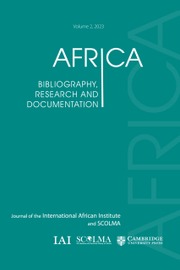No CrossRef data available.
Article contents
Extract
I worked directly for Hans Zell from 1984 to 1995. I had been seeking a change of career after a move to Oxford, and saw the advertisement by Hans Zell Publishers, exactly matching what I sought – publishing, books, with the bonus of Africa. That job informed the rest of my working life.
Information
- Type
- Hans Zell Festschrift: sixty years of service to African scholarship
- Information
- Copyright
- © The Author(s), 2025. Published by Cambridge University Press on behalf of the International African Institute
References
Ail, A., Jay, M. and Kitchen, S. (2024) ‘The African Books Collective: a conversation across three generations’, Logos: Journal of the World Publishing Community 2–3: 83–90.Google Scholar

